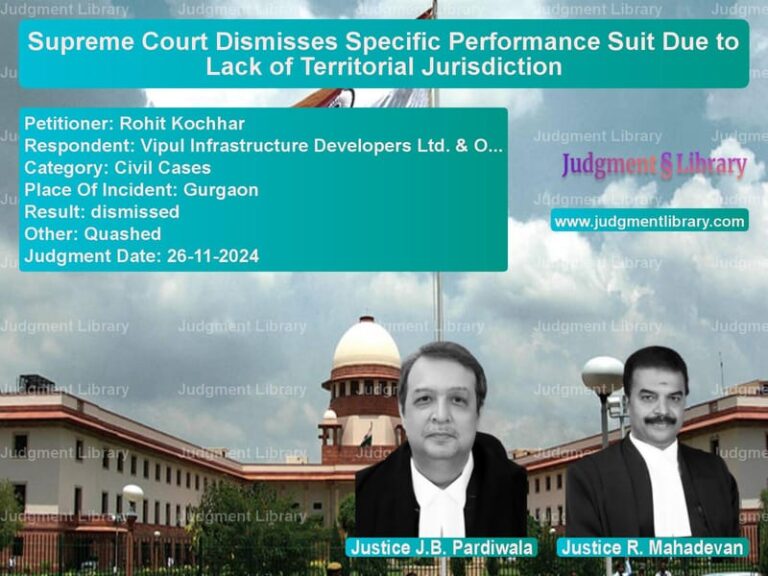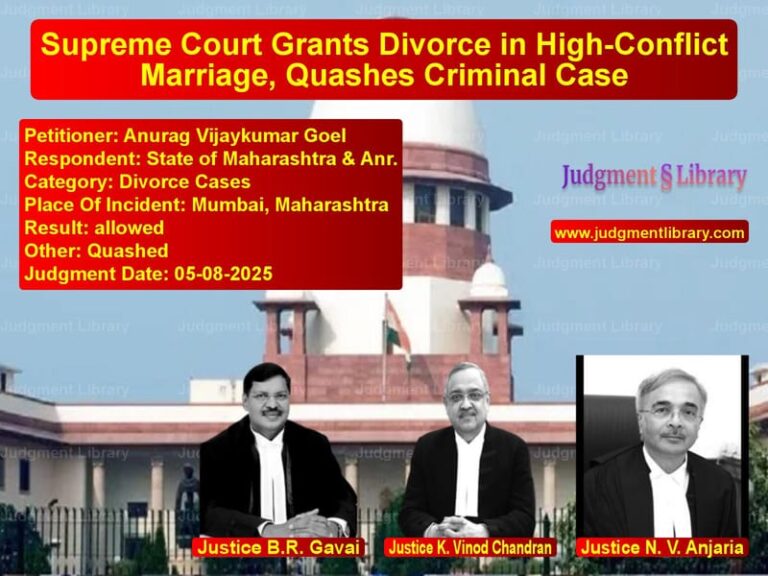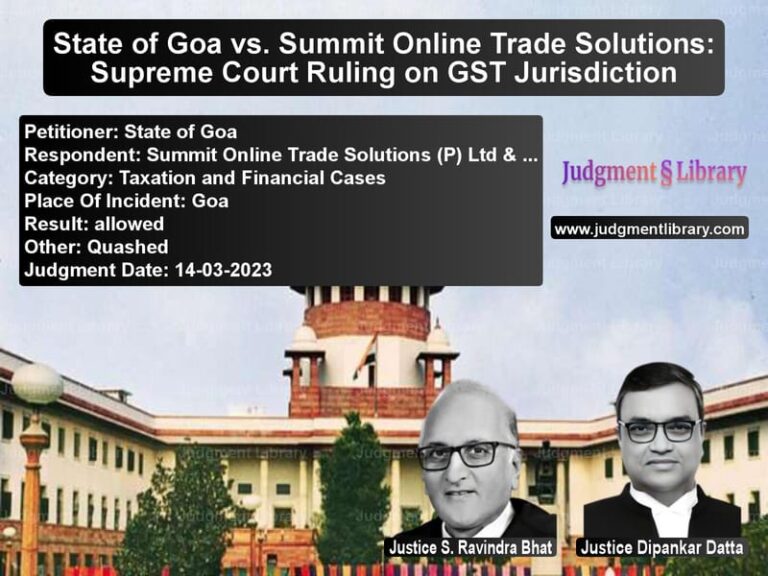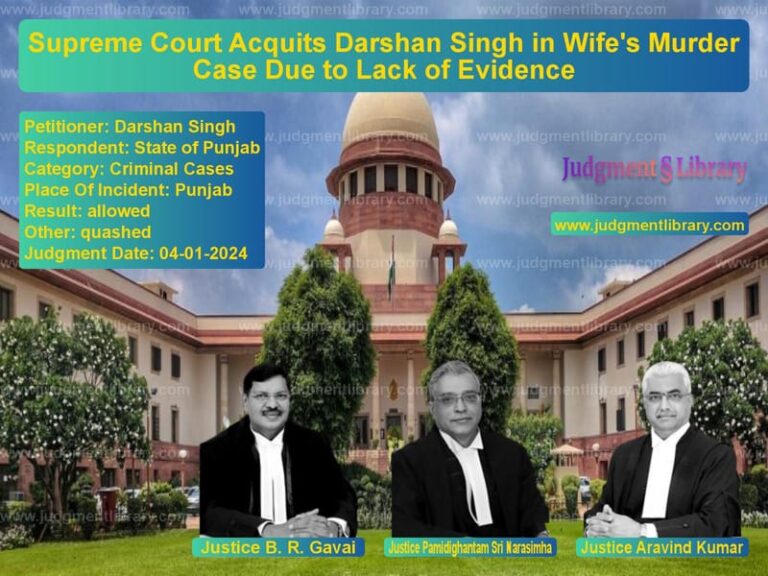Supreme Court Defines Scope of Transaction Value in Excise Duty Under Central Excise Act
The Supreme Court of India delivered a landmark judgment on May 11, 2018, in Commissioner of Central Excise, Indore vs. M/S Grasim Industries Ltd., clarifying the scope of transaction value in the levy of excise duty under the Central Excise Act, 1944. The ruling addressed whether additional charges such as packing, rental, repair, and service fees should be included in the assessable value for excise duty calculation.
The judgment aimed to resolve conflicts between previous decisions, particularly Union of India vs. Bombay Tyre International Ltd. and Commissioner of Central Excise, Pondicherry vs. Acer India Ltd., ensuring consistency in excise duty valuation.
Background of the Case
The respondent, Grasim Industries Ltd., and other assessees were engaged in the manufacture of dissolved and compressed industrial gases, liquid chlorine, cotton yarn, and post-mix concentrate. These products were supplied in containers such as tonners, cylinders, carboys, paper cones, HDPE bags, and canisters.
The company charged customers additional amounts under various heads, including:
- Packing charges
- Wear and tear charges
- Facility charges
- Service charges
- Delivery and collection charges
- Rental charges
- Repair and testing charges
The tax authorities argued that these charges should be included in the assessable value under Section 4 of the Central Excise Act, 1944, as amended on July 1, 2000. The assessees contended that these were ancillary charges separate from manufacturing costs and should not be subject to excise duty.
Legal Issues Considered
- Should additional charges such as packing, rental, and service fees be included in the transaction value for excise duty calculation?
- What is the scope of transaction value under Section 4 of the Central Excise Act?
- Does the amended definition of transaction value change the principles governing excise duty calculation?
- Should the Supreme Court reconsider previous rulings in Bombay Tyre International Ltd. and Acer India Ltd.?
Petitioner’s Arguments
The Commissioner of Central Excise, Indore, argued:
- Excise duty should be levied on the total amount paid by customers, including all additional charges.
- The concept of transaction value under the amended Section 4 was broader than the earlier normal price concept.
- All amounts payable by the buyer as a condition of sale should be included in the assessable value.
- The assessees were attempting to artificially exclude charges directly linked to the supply of goods.
Respondent’s Arguments
Grasim Industries Ltd. and other assessees countered:
- Excise duty should be levied only on manufacturing cost plus manufacturing profit.
- Additional charges were for ancillary services and should not be included in the assessable value.
- The Supreme Court’s ruling in Acer India Ltd. supported the exclusion of charges unrelated to manufacturing.
- Including these charges would unjustifiably expand excise duty beyond its intended scope.
Supreme Court’s Observations
The Supreme Court analyzed the amendments to Section 4 of the Central Excise Act, 1944, and stated:
“Excise duty is a levy on manufacture, but the measure of tax can be determined based on transaction value, which includes additional charges if they are conditions of sale.”
The Court further noted:
“The measure of the levy must not be confused with the nature thereof, though there must be some nexus between the two.”
The Supreme Court reaffirmed the key principles established in Bombay Tyre International Ltd. and held that transaction value includes all charges contributing to the price payable by the buyer.
Final Judgment
The Supreme Court ruled in favor of the tax authorities, holding that:
- All amounts charged to the buyer, including packing, rental, and testing fees, were part of the transaction value.
- Excise duty should be calculated based on the total amount payable as a condition of sale.
- The decision in Bombay Tyre International Ltd. correctly interpreted excise duty valuation.
- The revised definition of transaction value under the 2000 amendment aligned with the fundamental principles of excise duty.
The Court concluded:
“The measure of the levy contemplated in Section 4 of the Act will not be controlled by the nature of the levy. So long a reasonable nexus is discernible between the measure and the nature of the levy, both Section 3 and 4 would operate in their respective fields.”
Key Takeaways from the Judgment
- The Supreme Court clarified that transaction value under Section 4 includes all amounts payable by the buyer.
- The ruling reaffirmed that excise duty can include charges beyond just manufacturing costs.
- The decision resolved conflicts between previous judgments, ensuring consistency in excise duty valuation.
- The ruling has significant implications for manufacturers attempting to exclude ancillary charges from excise duty calculations.
This ruling provides much-needed clarity on how excise duty is determined, ensuring that manufacturers cannot artificially reduce their tax liabilities by excluding essential components of transaction value.
Petitioner Name: Commissioner of Central Excise, Indore.Respondent Name: M/S Grasim Industries Ltd..Judgment By: Justice Ranjan Gogoi, Justice N.V. Ramana, Justice R. Banumathi, Justice Mohan M. Shantanagoudar, Justice S. Abdul Nazeer.Place Of Incident: Indore, Madhya Pradesh.Judgment Date: 11-05-2018.
Don’t miss out on the full details! Download the complete judgment in PDF format below and gain valuable insights instantly!
Download Judgment: Commissioner of Cent vs MS Grasim Industrie Supreme Court of India Judgment Dated 11-05-2018.pdf
Direct Downlaod Judgment: Direct downlaod this Judgment
See all petitions in Income Tax Disputes
See all petitions in GST Law
See all petitions in Tax Evasion Cases
See all petitions in Judgment by Ranjan Gogoi
See all petitions in Judgment by N.V. Ramana
See all petitions in Judgment by R. Banumathi
See all petitions in Judgment by Mohan M. Shantanagoudar
See all petitions in Judgment by S. Abdul Nazeer
See all petitions in allowed
See all petitions in Modified
See all petitions in supreme court of India judgments May 2018
See all petitions in 2018 judgments
See all posts in Taxation and Financial Cases Category
See all allowed petitions in Taxation and Financial Cases Category
See all Dismissed petitions in Taxation and Financial Cases Category
See all partially allowed petitions in Taxation and Financial Cases Category







